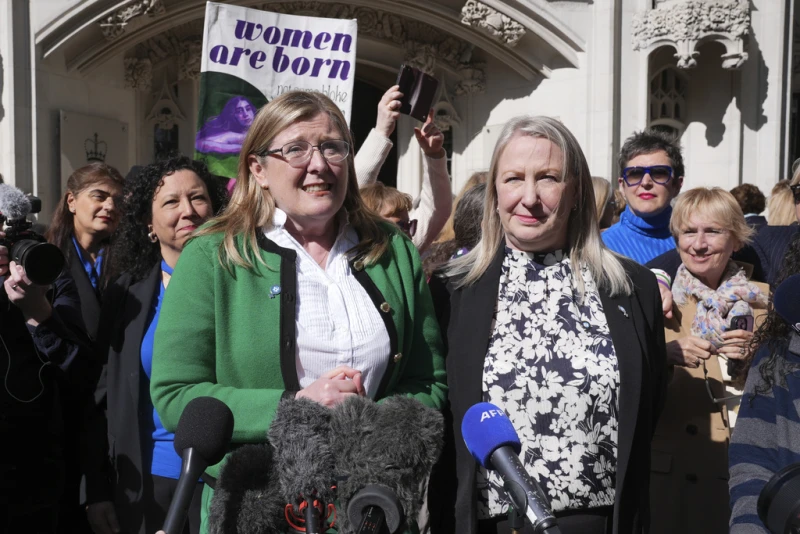Britain’s highest court rules in favor of biological women

 Susan Smith (left) and Marion Calder, co-directors of For Women Scotland, with campaigners celebrate outside the U.K. Supreme Court in London on Wednesday April 16, 2025, after the terms “woman” and “sex” in the Equality Act were ruled to refer to a biological woman and biological sex. / Credit: Press Association via AP Images
Susan Smith (left) and Marion Calder, co-directors of For Women Scotland, with campaigners celebrate outside the U.K. Supreme Court in London on Wednesday April 16, 2025, after the terms “woman” and “sex” in the Equality Act were ruled to refer to a biological woman and biological sex. / Credit: Press Association via AP Images Washington, D.C. Newsroom, Apr 16, 2025 / 16:05 pm (CNA).
The Supreme Court of the United Kingdom ruled on Wednesday that only biological women are protected under Britain’s Equality Act, contradicting prior statutory guidance by the Scottish government.
Britain’s highest court found in the landmark decision that individuals who have obtained a gender recognition certificate (GRC) of legal transition from male to female are not considered women under the 2010 Equality Act.
“The unanimous decision of this court is that the terms ‘woman’ and ‘sex’ in the Equality Act 2010 refer to a biological woman and biological sex,” said Patrick Stewart Hodge, deputy president of the Supreme Court of the U.K., reading the decision.
“But we counsel against reading this judgment as a triumph of one or more groups in our society at the expense of another,” he added.
The U.K. court ultimately ruled that “the concept of sex is binary, a person is either a woman or a man,” and that it would be “incoherent and impracticable” to allow persons with a GRC to be categorized as women under the Equality Act.
However, it also specifies that this does not mean persons who identify as transgender are stripped of legal protections as a protected class. Rather, it specifies that the “protected characteristic” of persons who identify as transgender is “gender reassignment” rather than “sex.”
“It is not the role of the court to adjudicate on the arguments in the public domain on the meaning of gender or sex, nor is it to define the meaning of the word “woman” other than when it is used in the provisions of the [Equality Act] 2010,” the ruling notes.
The decision follows a long drawn-out legal case between the Scottish government and For Women Scotland, a women’s rights organization dedicated to improving protections for women and children.
The dispute began in 2018 after the passage of the Gender Representation on Public Boards (Scotland) Act 2018, which sought to counter gender imbalance on public sector boards and included transgender-identifying persons with GRC certificates in the quotas as women.
For Women Scotland challenged the act in 2022, leading to a drawn-out battle in which the group filed two appeals that were both dismissed before the case ended up in front of the U.K. Supreme Court three years later.
UK Supreme Court just ruled that law defines women as people born biologically female.
This is a huge win for women, men, and sanity in the UK and the West.
Now every country needs to get onboard and recognize in law what is a woman.
Congratulations to UK women! pic.twitter.com/nJU0zQvIgl
— Paul A. Szypula 🇺🇸 (@Bubblebathgirl) April 16, 2025
“Today the judges have said what we always believed to be the case: that women are protected by their biological sex, that sex is real and that women can now feel safe that services and spaces designated for women are for women,” For Women Scotland co-founder Susan Smith told those gathered outside the courthouse, according to Reuters.
Author J.K. Rowling, who has been outspoken on the transgender issue, reacted to the ruling on social media: “It took three extraordinary, tenacious Scottish women with an army behind them to get this case heard by the Supreme Court and, in winning, they’ve protected the rights of women and girls across the U.K.”
It took three extraordinary, tenacious Scottish women with an army behind them to get this case heard by the Supreme Court and, in winning, they’ve protected the rights of women and girls across the UK. @ForWomenScot, I’m so proud to know you 🏴💜🏴💚🏴🤍🏴 https://t.co/JEvcScVVGS
— J.K. Rowling (@jk_rowling) April 16, 2025





